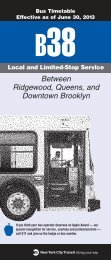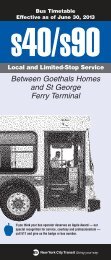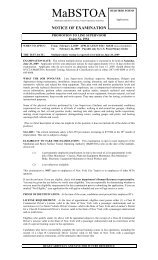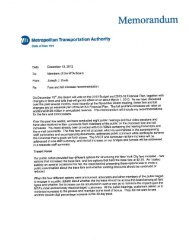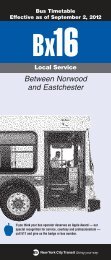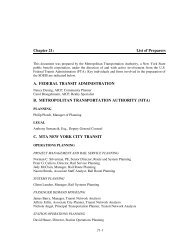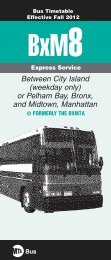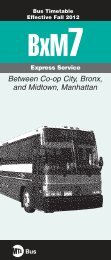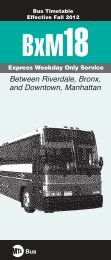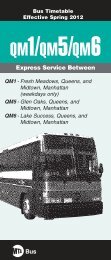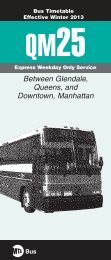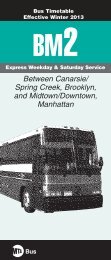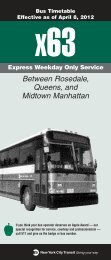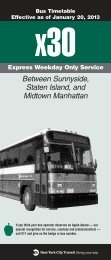Greening Mass Transit & Metro Regions: The Final Report - MTA
Greening Mass Transit & Metro Regions: The Final Report - MTA
Greening Mass Transit & Metro Regions: The Final Report - MTA
You also want an ePaper? Increase the reach of your titles
YUMPU automatically turns print PDFs into web optimized ePapers that Google loves.
46<br />
• Develop a form for requesting “end-of-cycle” plans from <strong>MTA</strong> suppliers and contractors.<br />
• Develop an extension or adaptation of the LCA plan for rating <strong>MTA</strong> facilities, as recommended in the Facilities chapter<br />
of this report.<br />
• Develop special guidelines based on materials analysis used by the <strong>MTA</strong> Smart Fleets Task Force to reduce car weights<br />
and traction power, as described in the Energy/Carbon chapter of this report. Such analysis of vehicle materials and<br />
components can eventually be integrated into the overall materials flow plan.<br />
Lifecycle Analysis Process<br />
Design<br />
Supply Manuf.<br />
Environ.<br />
Information flow<br />
Environ.<br />
Sell Use Reuse<br />
Environ.<br />
Material flow Interactive with environment<br />
Recommendation 4. Seek More Revenue and Energy Potential from <strong>MTA</strong> Waste<br />
As it develops a unified materials baseline, the <strong>MTA</strong> should identify more opportunities to turn parts of its waste stream<br />
from a liability into an asset. <strong>The</strong> <strong>MTA</strong> should enhance its efforts to expand markets for its waste and pursue the potential<br />
for generating revenue from customer and industrial waste. <strong>The</strong> Commission also recommends that the <strong>MTA</strong> explore<br />
opportunities to turn its non-recyclable organic waste into energy by using Anaerobic Digester Gas (ADG) or other<br />
systems to generate electricity on a renewable basis, possibly in partnership with NYSERDA or other partners.<br />
Recommendation 5. Flex Market Power to Promote Green Goods<br />
<strong>The</strong> <strong>MTA</strong> should flex its market power to spur the creation of green goods and services in New York State, Connecticut,<br />
and the mid-Atlantic states. <strong>The</strong> <strong>MTA</strong> should procure fleets, equipment, and materials with energy-efficient technologies<br />
to aid in the reduction of CO2 emissions and hazardous materials and to fuel innovation in the development of sustainable<br />
technologies. This would extend to rail, bus, and car fleets, as well as to lighting fixtures, water appliances, and other equipment.<br />
<strong>The</strong> <strong>MTA</strong> should also use its market power to demand the reduction of<br />
Green Ideas from <strong>MTA</strong> Employees unnecessary packaging in the products and materials it purchases. As a large<br />
"We've done a lot of interest- regional consumer, the <strong>MTA</strong>’s procurement criteria can help drive green production<br />
ing work on investigating throughout the mid-Atlantic region.<br />
new products and materials<br />
to make rolling stock into<br />
more sustainable, smart<br />
“What Gets Measured Gets Managed“ – <strong>The</strong> <strong>MTA</strong> Green Action Plan<br />
fleets. <strong>The</strong> trick is light-<br />
<strong>The</strong> <strong>MTA</strong>’s recently conceived Green Procurement Action Plan will identify material cycles with the greatest<br />
weighting subway cars to reduce traction power<br />
measurable impact on the <strong>MTA</strong>’s ecological and carbon footprints. To be launched by the end of 2009, the<br />
without compromising safety. <strong>The</strong> <strong>MTA</strong> needs to<br />
initial plan will aim to reduce consumption of office paper, toner, plastics, and ink and identify recycled and<br />
stay out front on this kind of materials research<br />
other green products. <strong>The</strong> Plan will also provide guidance for standardizing and managing green office policies<br />
that will allow us to reduce our energy usage<br />
across all <strong>MTA</strong> agencies. It will help procurement departments define terms, evaluate products, and justify price<br />
and carbon emissions."<br />
premiums for greener products.<br />
– Gene Sansone, New York City <strong>Transit</strong><br />
Dispos.<br />
Source: http://www.congrex.nl/08c13/presentations%5Cpde2008-30-vanExel.ppt.



